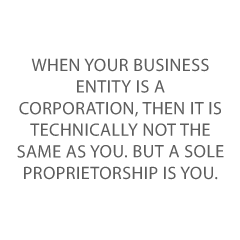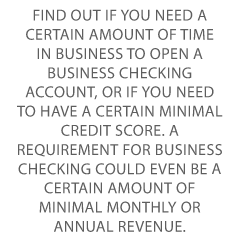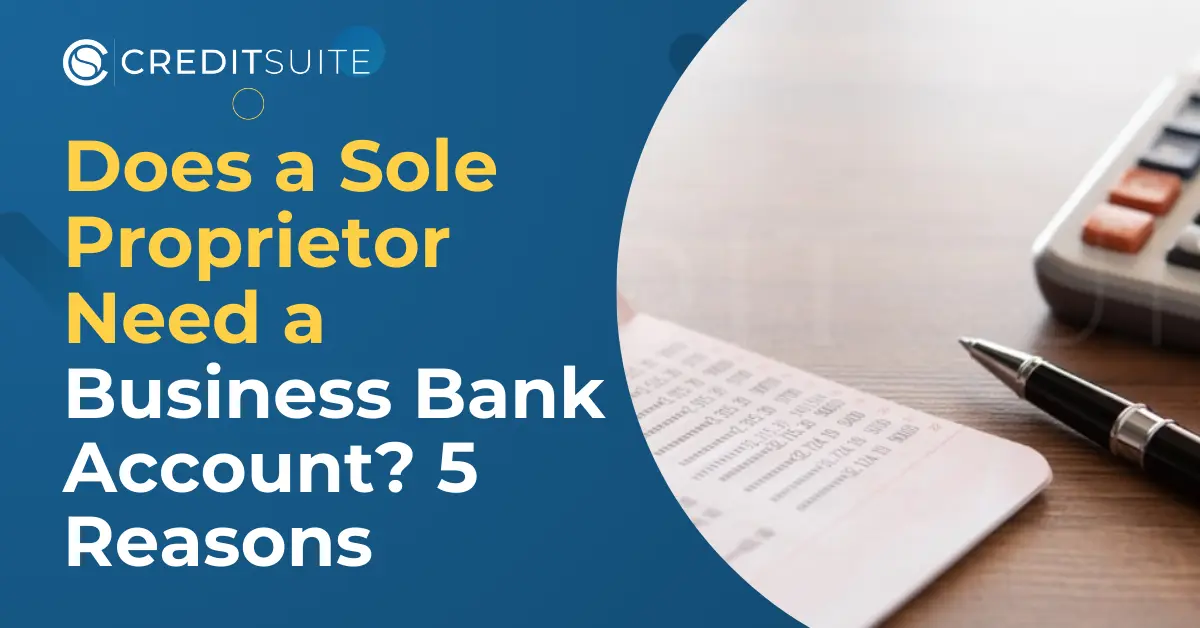If you’re in business for yourself, and you’re not yet incorporated, it’s a question you may have considered at least once: does a sole proprietor need a business bank account?
If you want to better protect your personal assets and keep your business and personal account separate, then a business bank account is the way to go. Here’s some reasons why—and what to look for when you’re ready to take the plunge.
This blog post may contain affiliate links, meaning when you click the links for some products and make a purchase, Credit Suite receives a commission at no additional cost to you.
Reasons You Should Have A Separate Business Bank Account
Reason 1 – There Could be a Legal Liability Issue if You Don’t Separate Your Accounts
A separate business bank account can help with discovery in a legal case. Because if you think your small business can never, ever be sued, think again.
Even a purely online small business can end up delivering products that are defective, be late paying its bills, or infringe on another’s copyright. And yes, this can include a small business that you see as being merely a side hustle.
A separate bank account helps assure that the only records a legal team will review are related directly to your small business. It’s a lot less likely that they would touch your personal bank account.
Reason 2 – Taxes Are a Lot Easier as You Do Not Commingle Funds
 When your business entity is a corporation, then it is technically not the same as you. But a sole proprietorship is you.
When your business entity is a corporation, then it is technically not the same as you. But a sole proprietorship is you.
In particular, if you are claiming losses or profits, then the IRS wants to see the specifics. No imagine your tax return being audited, A separate bank account for business means you can provide relevant information to the IRS quickly.
When you’re still using your personal bank account, however, tax auditors will comb through it—and ask you questions about whatever they find odd or concerning. And, if you share bank account record keeping duties with anyone, the IRS will want to question them as well.
Reason 3 – Bookkeeping is Easier
Do you really want to look at a ton of receipts every time you want to balance your personal checking account? You will if you do not open a separate account.
There can be some receipts that are exceptionally vague. Weeks or even months after a purchase, do you want to be wracking your brains, trying to figure out if it’s a personal expense or a business expense?
If you have two separate accounts, you won’t have this issue. While you still want to know the specifics on your business expenses, at least you will not also have to determine if they truly were expenditures by your business or by you.
Reason 4 – Many Starter Vendors Require One
The easiest and best way to start a business credit history and get credit cards for your small business is to work with starter vendors. But many of them require that your small business have its own separate business account.
A business credit card provider will want to know that your small business is legitimate and not just a hobby.
A small business owner with a separate business bank account exudes an air of professionalism. And, they don’t look like they will simply pocket any profits and keep sketchy books (if they do any bookkeeping at all).
The starter vendor cares a lot less about your books than it does about its own. But in the event of, in particular, a product liability lawsuit, they may have to prove chain of custody or the details of the distribution chain.
Picking through your personal bank account’s many entries to find what’s relevant is not a good use of their time—or their lawyers’ time, at hundreds of dollars (at minimum!) per hour.
Reason 5 – Your Needs and Preferences Aren’t Necessarily the Same as for Your Personal Account
A separate business bank account may offer a higher interest rate. You may need to keep a different minimum balance in a business checking account versus a personal checking account. Your business bank account statements may come with different details.
A checking account for your home may offer cash back and that may satisfy your needs. A business checking account could, for example, offer a higher rate of return. Having a separate bank account for your business means you can take advantage of both perks.
Also, your personal vs business checking account could even come with different fees for returned checks or going below the minimum balance requirement.
What To Look For In A Business Bank Account
#1 – The Introductory Offer (if Any)
Business bank accounts can come with intro offers to attract business owners.
These offers may include bonus cash for making initial cash deposits of a certain sum and maintaining the balance for a certain period of time. This is often for a few months.
Others offer lower fees for opening new business accounts. But don’t be bedazzled by a robust introductory offer if the bank falls short in other areas. Your best bank may have other features that make a sole proprietorship bank account worth your while.
A sole proprietor should shop around and compare offers, much like with anything else.
#2 – Requirements and Fees
What’s the fee for a business checking account? Is there more than one kind of checking account available? What is the interest rate for a business savings account (if any)?
If you open up more than one business bank account, can you get a break on fees, or better rates for, say, your checking account?
 Find out if you need a certain amount of time in business to open a business checking account, or if you need to have a certain minimal credit score. A requirement for business checking could even be a certain amount of minimal monthly or annual revenue.
Find out if you need a certain amount of time in business to open a business checking account, or if you need to have a certain minimal credit score. A requirement for business checking could even be a certain amount of minimal monthly or annual revenue.
Can you meet the requirements for getting business bank accounts?
#3 – Merchant Credit Card Processing Functionality
Beyond a checking account, will you be able to accept credit card payments from your customers? Business checking is all well and good, but the faster you can deposit into it, and the more you can deposit into it, the more useful business checking is going to be.
If you can process your credit card payments, then your business checking balance will rise a lot more quickly. This can also stimulate prospects and customers to spend more money, and that can help you keep business checking in the black.
A lack of merchant credit card processing can be a reason to not do business with a bank at all, let alone open business bank accounts there.
#4 – Business Credit Cards
Does this bank you are looking at offer business credit cards in your business name? If so, what are their terms?
Can you get spending controls built into a credit card? Can you build business credit if you change from a sole proprietorship to, say, a limited liability partnership? How about virtual cards, or even a way to have receipts automatically sorted by spending type?
Business owners should always be looking to the future of a business as well as its present needs. And the area of business credit is no exception.
Cards are a vital part of business finance, so you should always take them into consideration.
How To Open a Business Bank Account For A Sole Proprietorship
Step 1 – Registering Your Business Name
Register your business name with local and state agencies before you even approach a bank. Why? Because they will look up your business! For some industries, this may be a nonnegotiable requirement.
While you’re at it, you should get an EIN (Employer Identification Number) for your business. If you think you may ever wish to move past a sole proprietorship, then an EIN is going to be a must. May as well take care of this now. They’re free anyway.
Step 2 – Pull Together All Necessary Documentation
Any bank is going to want to see documentation from you, so you may as well get it together now.
Necessary documents will include your identification (like a driver’s license or Social Security card) and your business’s EIN, if you have one.
Bring in your business licenses and revenue and tax information. You should also have your business formation documents on hand. If your sole proprietorship is a DBA, then bring in those documents as well.
Step 3 – Shop Around For the Best Bank Account to Meet Your Needs
Some providers have a free account option, so if your business is very new, that could be a better choice, at least to get started.
Decide if a savings or checking account is better for your needs. Take into consideration fees, interest rates, and requirements. There’s little sense in trying for an account where getting it is a long shot.
And take a look at purely online options as well. Fintech companies are more lenient about many requirements, so in particular if your personal credit could be better, take a good look at them.
Step 4 – Open Your New Account
Some providers will allow you to complete the entire process online. However, others may require you to visit a branch. If the bank requires you to visit a branch to finish applying for an account, then always make sure you choose one with a nearby location.
Some banks will require you to make a deposit in order to get started. You may be able to do this with a check or a wire transfer.
Keep in mind that sometimes it will take more than one day to open an account.
Step 5 – Add Money!
Your brand new account will not do you much good unless you actually add some cash to it. Beyond any minimum amount you need to open it, the idea behind any account is for it to act as a pipeline.
Your account should be a place to park money that comes in, and then draw on it to take out funds for everything from payroll to rent to your own salary.
Also—the better you manage your account, the more you can increase your chances of getting a business loan in the future.
FAQs
What Type of Bank Account Does a Sole Proprietor Need?
This is going to depend upon your needs. For businesses which do virtually all their business transactions online, a checking account may not even be strictly necessary. If you can cover payroll and expenses with, say, Paypal, you might not need to ever cut a check.
Also, because (despite how much the Fed has raised rates recently) interest rates are still rather low, it may not pay to put money into a business account for savings.
A particularly small company will likely not need more than one account unless the owner has a very specific purpose or purposes in mind.
If you make and receive payments more often than other companies, you may do well with a current account, which exists for this particular reason.
Can I Run my Business Through my Personal Bank Account?
Technically, yes. But it’s not recommended that you do so.
Here’s why.
- You’re making your taxes harder than they need to be, by keeping everything together, when you’re only going to have to separate and itemize everything anyway.
- If your business is ever sued, you’ve made it harder to protect your personal assets.
- You’ve closed off your business from working with starter vendors.
- You make it harder to convert your business to a corporation or another business structure because the books will have to be untangled anyway.
- Separate accounts make it possible to fulfill different needs. You may be your business (which is the very definition of a sole proprietorship), but getting, say, travel points on the personal side won’t serve your business well if it’s purely online.
- Oh, and the Small Business Administration wants your business to have its own accounts, too.
Can I Open a Business Account with Just my EIN Number?
Not with just your EIN, no.
A bank will want more information than this before it will open an account.
In part, a bank will want to see personal identifying information, licenses if applicable, and a business registration if required (this is often by industry).
Because your business is a sole trader, you will need to provide your Social Security Number and proof of your address.
Also, if your business is a DBA, you will need to provide a certificate showing that name.
Some banks may want to see revenue and tax information. That tends to mean older tax returns and anything showing proof of revenue and cash flow, such as your business’s books.

